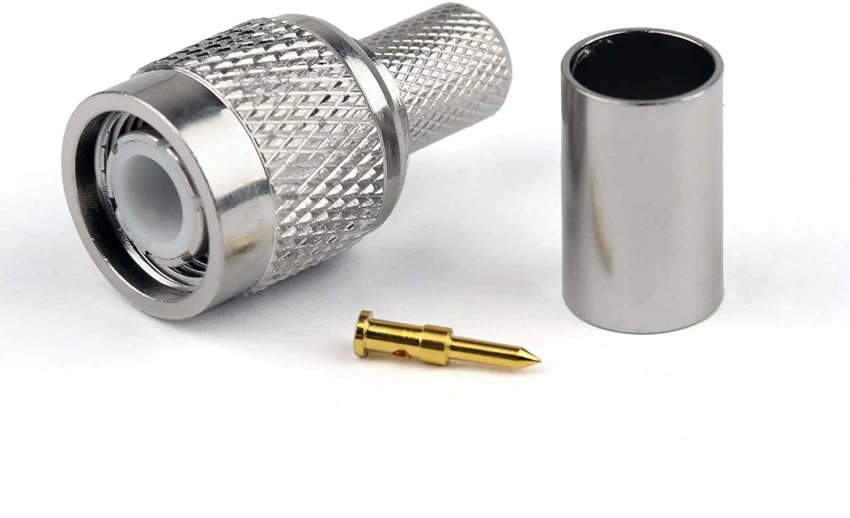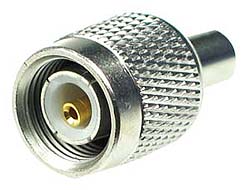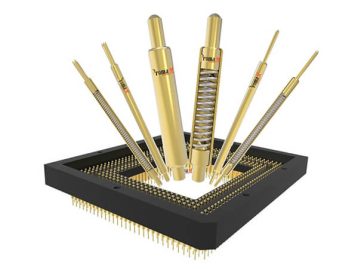In the vast landscape of connectivity, one thing remains clear – the search for the perfect RF connector is no easy feat.
The world of RF connectors, with its plethora of options like BNC and SMA, can often leave even seasoned tech enthusiasts feeling bewildered. But don’t fret; we’re about to unravel the mysteries surrounding TNC connectors.
Whether you’re a radio frequency expert or a newcomer to the field, you’re about to embark on an enlightening journey, gaining valuable insights into the world of TNC connectors.
Without further delay, let’s delve right into this exploration.
What are TNC Connectors?
TNC connectors, or Threaded Neill-Concelman Connectors, are specialized RF connectors built for high-frequency applications. They ensure secure electrical connections capable of handling demanding signal needs.
How Do They Work?
TNC connectors efficiently send electrical signals while maintaining data integrity. Their threaded coupling mechanism secures a stable connection. It is critical in high-frequency applications susceptible to signal interference.
TNC Connectors vs. Other RF Connectors: A Quick Comparison
| TNC Connectors | BNC Connectors | SMA Connectors | |
| Mechanism | Threaded for secure connections | Bayonet-style for quick connections | Compact, quick connections |
| Use Cases | High-frequency applications | General-purpose, lower security | Smaller, lower-frequency apps |
| Signal Integrity | Excellent, minimal signal loss | May lack security in high-freq. | Excellent electrical performance |
Why are TNC Connectors Used in High-Frequency RF Applications?
In the tech world, high-frequency signals are crucial for Wi-Fi, cellular networks, and satellite communications. However, these signals are sensitive and easily disrupted by cable length, interference, and connectors. That’s where connectors like TNC come in.
Benefits of Using TNC Connectors
Excellent Signal Integrity
Specialized for high-frequency applications, TNC connectors excel in signal transmission. Their threaded coupling minimizes signal loss, ensuring accurate data transmission without distortion.
Durability and Robustness
TNC connectors are built to withstand harsh environments, including aircraft vibrations, outdoor telecommunication gear, and military conditions. Their robust design ensures reliable performance.
Secure and Easy Installation
The threaded design of TNC connectors guarantees a perfect and vibration-resistant connection. They are also user-friendly, making installation efficient and reducing setup errors in critical scenarios.
Other Benefits
TNC connectors are highly versatile for high-frequency applications, with a wide range of configurations. They work well with various equipment and systems, making them adaptable. Also, these connectors are known for their durability, reducing the need for frequent replacements and maintenance.

Common Applications of TNC Connectors
Telecommunications
In the ever-connected world of telecommunications, TNC connectors are pivotal in various applications, including the following:
Cellular Networks
TNC connectors assure distortion-free transmission in cellular base stations and antennas.
Satellite Communication
TNC connectors maintain signal integrity for TV broadcasts and emergency communication systems via satellite.
Wi-Fi Equipment
TNC connectors assure stable and secure internet connections through Wi-Fi routers.
TNC connectors silently contribute to your flawless communication, whether you’re browsing the web, flying, or safeguarding national security.
Aerospace and Aviation
In the aerospace and aviation industries, reliability is paramount. TNC connectors are the preferred choice for several crucial applications.
Aircraft Communication
TNC connectors ensure seamless communication within aircraft, even in extreme vibration and temperature fluctuations.
Satellite Communication
TNC connectors help in uninterrupted satellite communication, which is necessary for tracking and navigation during flights.
Ground Equipment
Ground-based equipment, including radar systems, relies on TNC connectors to maintain secure and uninterrupted connections.
Military and Defense
TNC connectors excel in military communication, especially in the following scenarios:
Radar Systems
Radar systems demand pinpoint accuracy and reliability. TNC connectors guarantee precise communication in these critical systems.
Secure Communication
TNC connectors secure military communications and safeguard classified information during transmission.
Field Deployments
Military equipment often faces extreme conditions during field operations. TNC connectors can endure these harsh environments, making them the ideal choice.
Test and Measurement Equipment
In labs and research facilities, precision is essential. TNC connectors play a significant role in test and measurement equipment.
Oscilloscopes
These devices, used to visualize electrical signals, depend on TNC connectors for accuracy.
Signal Generators
TNC connectors send signals accurately and keep integrity in generators for testing and calibration.
Spectrum Analyzers
Spectrum analyzers use TNC connectors for reliable and precise analysis of RF signals.
Other Applications
Medical Equipment TNC connectors contribute to data transmission and patient safety in some high-frequency medical devices.
Radio Broadcasting
TNC connectors ensure uninterrupted signal transmission from the studio to the airwaves in radio broadcasting.
Ham Radio
Ham radio enthusiasts rely on TNC connectors for high-quality communication in their hobby.

Types of TNC Connectors
TNC connectors vary in design and function, each tailored for specific purposes.
Bayonet-Lock TNC Connectors
These connectors use a quick twist-on and twist-off mechanism, ideal for applications needing frequent changes while ensuring a secure connection.
Reverse-Bayonet TNC Connectors
Designed for robustness, they feature a reverse locking mechanism, providing enhanced stability against vibrations or movement, ensuring steadfast connections.
Threaded TNC Connectors
Known for their secure threaded coupling, threaded TNC connectors are preferred for high-frequency applications that demand stable and reliable connections with minimal need for frequent disconnections.
Differences and Use Cases
In short, the choice of TNC connector type depends on your application’s specific needs. Bayonet-lock for easy connections, reverse bayonet for stability in turbulent environments, and threaded TNC for precision and signal integrity.
| TNC Connector Types | Key Characteristics | Common Use Cases |
| Bayonet-Lock TNC Connectors | Quick and easy coupling and uncoupling | Testing equipment, RF gear with frequent changes |
| Reverse-Bayonet TNC Connectors | Exceptional stability, even in high-vibration settings | Aerospace and military applications for uninterrupted communication |
| Threaded TNC Connectors | Optimal for signal integrity and stability | High-frequency applications, especially in telecommunications |
Key Specifications for Choosing TNC Connectors
When selecting a TNC connector, understanding specific specifications is vital.
Impedance
TNC connectors typically have a 50-ohm impedance. Matching this impedance with your system guarantees optimal signal transmission by reducing reflections and losses.
Frequency Range
TNC connectors are designed for high-frequency applications, covering from DC to 11 GHz. Choose one that aligns with your system’s frequency requirements to prevent signal distortion.
Power Handling Capability
Different TNC connectors have varying power handling capabilities. Select one that matches your application’s power levels to avoid overheating and performance issues.
Voltage Rating
TNC connectors should handle your system’s voltage levels to evade electrical failures and associated risks.
Operating Temperature Range
Consider the connector’s operating temperature range to ensure reliable performance in various environmental conditions, from extreme cold to heat.

Selecting the Right TNC Connector
To choose the ideal TNC connector:
- Impedance should align to prevent signal issues.
- The connector should cover your required frequency range.
- Match the operating conditions, including temperature, vibrations, and moisture, to select a connector capable of withstanding these challenges, assuring optimal performance and longevity.
TNC Connector Installation and Maintenance
Proper Installation: Step-by-Step
Connector Inspection
Before installation, examine male and female connectors for visible damage, like bent pins or corrosion. Replace damaged components if necessary.
Cable Preparation
Ensure cable ends are correctly prepared by stripping them according to connector specifications and exposing the required conductor and dielectric for a reliable electrical connection.
Soldering
Carefully solder connectors onto the prepared cable end to maintain signal integrity and prevent signal loss.
Threading
Attach TNC connectors by securely threading them onto the corresponding socket, ensuring a robust connection.
Tightening
Use an appropriate wrench for TNC connectors, avoiding over-torquing to prevent damage or connection issues.
Continuity Test
After installation, perform a continuity test to confirm an uninterrupted electrical path, essential for proper signal transmission.
Tips for Maintaining TNC Connectors
For the best performance of your TNC connectors, consider the following maintenance tips:
Regular Inspection
Periodically check for wear, damage, or corrosion to stop signal loss and assure durability.
Cleaning
Keep connectors debris-free with proper cleaning solutions for a reliable connection.
Apply Anti-Seize Compound
Use anti-seize compound on connector threads for easier disconnection and corrosion prevention, which is valuable for removable connectors.
Extending Connector Lifespan: Best Practices
To maximize TNC connector lifespan, follow these practices:
Proper Storage
Store connectors in a dry, clean, protected environment to avoid moisture and contaminants.
Handle with Care
Prevent excessive bending, twisting, or stress on connectors to protect them from mechanical damage.
Routine Maintenance
Establish regular inspections and cleaning to extend connector lifespan and maintain optimal performance.

Troubleshooting Common TNC Connector Problems
TNC connectors, while reliable, can face occasional problems.
Signal Interference
Symptoms Erratic or distorted data transmission, weak signals, or signal quality reduction.
Causes
Electromagnetic interference (EMI), poor cable shielding, or external RF interference.
Solutions
- Ensure proper cable shielding.
- Route cables away from RF interference sources.
- Use ferrite beads to absorb unwanted EMI.
- Consider signal amplifiers for weak signals.
Loose Connections
Symptoms
Intermittent signal loss or degradation.
Causes
Inadequate tightening during installation, mechanical stress, or vibrations.
Solutions
- Carefully tighten connectors to correct torque.
- Consider reverse-bayonet TNC connectors for stability.
- Use cable strain relief to reduce mechanical stress.
Corrosion and Wear
Symptoms
Degraded signal quality or complete connector failure.
Causes
Corrosion from moisture and contaminants, wear from repetitive mating.
Solutions
- Regularly inspect for corrosion or wear.
- Clean connectors with appropriate solutions.
- Apply anti-seize compound.
- Replace severely damaged connectors as needed.
By recognizing and addressing these common issues, you can maintain the reliability of your TNC connectors.
Conclusion
Known for precision, durability, and low signal loss, TNC connectors shine in high-frequency RF applications. Industries such as telecommunications, aerospace, and the military rely on them. Consider impedance, frequency range, and environmental factors when selecting the appropriate TNC connector.
Proper installation and regular maintenance are crucial for TNC connector performance. Follow installation guidelines, perform routine care, and follow best practices to prevent signal issues, loose connections, and corrosion.
TNC connectors are more than mere connectors; they are the dependable link in the high-frequency RF world. Make informed choices, diligently maintain your connectors, and trust in TNC connectors for seamless high-freque










